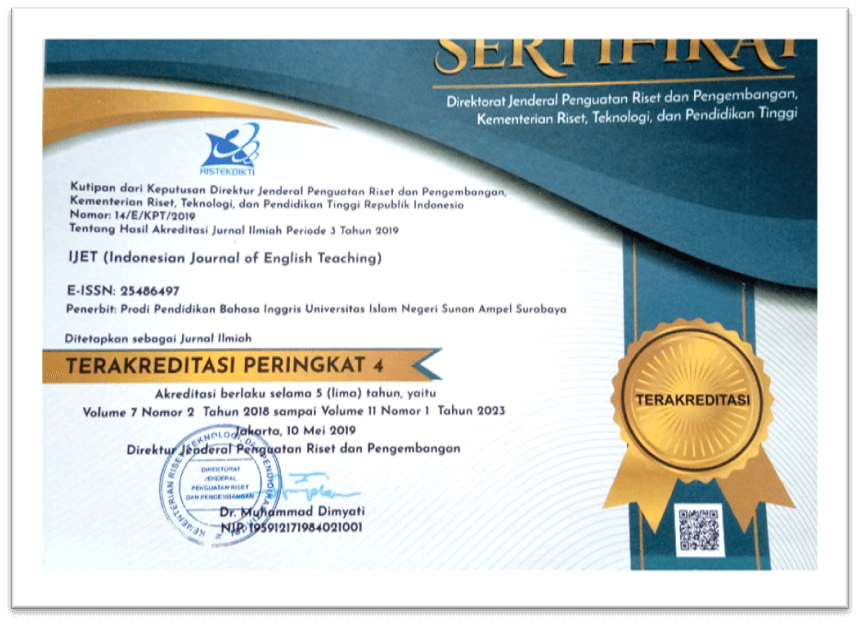Online Grammar Learning: How the Learners Perceive its Effectiveness
DOI:
https://doi.org/10.15642/ijet2.2023.12.1.83-93Keywords:
students’ perception; online grammar learning; problems; EFL learnersAbstract
The pandemic forced all learning to be done online using technologies that can connect students and teachers in different locations. This online teaching and learning also needs to be applied to the teaching and learning of English grammar which is usually much more comfortable to be done offline. This study was conducted to find out university students' perception about the effectiveness of their online grammar learning and their reasons to say that their online grammar learning is effective or ineffective. The data were collected by using a questionnaire to 35 university students of batch 2017, 2018, and 2019. The findings revealed that the most of the students (68.57%) perceived that the online grammar learning is not effective. The reasons are that they could not understand the materials easily when they learnt it online (65.71%), they could not interact with other friends to learn together (54.29%), they could not get grammar corrections from the teachers directly in online learning (37.14%), and they could not follow teachers' grammar explanation easily (37.14%). Besides that, the requirements that they needed to fulfill to use the applications for their online learning also becomes another problem in their grammar learning such as the applications used needed strong internet connections (65.71%), the applications required the students to have a large storage capacity in the device that they used for grammar learning (31.43%), and the applications required the students to have more than 1 gigabyte of internet quota (25.71%).
Downloads
References
Alian, J., Khodabandeh, F., & Soleimani, H. (2018). The effect of CALL-based tasks on EFL learners’ grammar learning. Teaching English with Technology, 18(3), 54-68.
Altunay, D. (2019). EFL students’ views on distance English language learning in a public university in Turkey. Studies in English Language Teaching, 7(1), 121-134.
Anderson, T. (2004). Towards a theory of online learning. In T. Anderson and F. Elloumi (Eds.), Theory and practice of online learning (pp. 33-60). Canada: Athabasca University.
Aslani, S. M., & Tabrizi, H. H. (2015). Teaching grammar to Iranian EFL learners through blended learning using multimedia softwares. Journal of Applied Linguistics and Language Research, 2(8), 76-87.
Bali, S., & Liu, M. C. (2018). Students’ perceptions toward online learning and face-to-face learning courses. Journal of Physics: Conference Series, 1108(1). https://doi.org/10.1088/1742-6596/1108/1/012094
Creswell, J. W. (2005). Educational research: Planning, conducting, and evaluating quantitative and qualitative research. Upper Saddle River, New Jersey: Pearson Education, Inc.
Fraenkel, J. R., Wallen, N. E., & Hyun, H. H. (2012). How to design and evaluate research in education (8th ed.). New York: Mc Graw Hill.
Gamlo, N. (2019). The benefits of integrating Learn English Grammar application into the Saudi EFL-Pre Intermediate preparatory year classroom. International Journal of English Language Education, 7(1),19-36.
Hazari, A. (2020, March 21). Coronavirus: online lessons benefit student with learning difficulties-spared the scrutiny of classmates, he flourishes. South China Morning Post. https://www.scmp.com/lifestyle/family-relationships/article/3076205/coronavirus-online-lessons-benefit-student-learning
Kilickaya, F. (2019). Using different types of computer-supported signaling in explicit online grammar instruction. In J. B. Son (Ed.), Context-Specific Computer-Assisted Language Learning: Research, Development and Practice (pp. 102-121). Queensland: Asia-Pacific Association for Computer-Assisted Language Learning.
Larsen-Freeman. (2014). Teaching Grammar. In M. Celce-Murcia, D.M. Brinton, & M.A. Snow (Eds.), Teaching English as a second or foreign language (pp.256-270). Boston, MA: National Geographic Learning.
Ozudogru, F., &Hismanoglu, M. (2016). Views of freshmen students on foreign language courses delivered via e-learning. Turkish Online Journal of Distance Education, 17 (1), 31-47.
Taj, I. H., Sulan, N. B., Sipra, M. A., & Ahmad, W. (2016). Impact of mobile assisted language learning (MALL) on EFL: A meta-analysis. Australian International Academic Centre, 7 (2), 76-83.
Zamari, Z. M., Adnan, A. H. M., Idris, S. L., &Yusof, J. (2012). Students’ perception of using online language learning materials. Procedia-Social and Behavioral Sciences, 67, 611-620.










